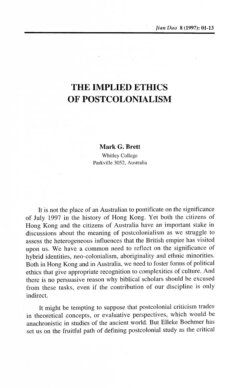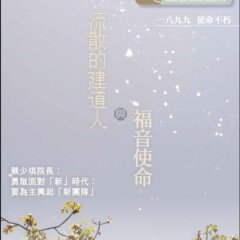The Implied Ethics Of Postcolonialism(後殖民批判所蘊含的倫理) / Mark G. Brett 布雷特
撮要
本文透過分析人類學有關「文化滲透」的研究,及後殖民「含混性」研究之間的關聯,指出企求保存單一文化的舉動是錯誤的;並以古以色列及現代本色化政治為例說明。但是,因為文化及族群之間存在著差異,所以,對一些缺乏政治力量的少數族群而言,族群中心主義仍是可以接受的。這種形式的族群中心主義需要在一種非普遍化及後現代式的倫理下運作。但另一方面,除非政府採用帝國主義式的不公平政治架構,否則政治力量須在公平原則下運作,因此。在政府層面而言,實踐後殖民倫理並不能摒除現代主義,即或抵抗式倫理是後現代的產物。
ABSTRACT
This article illustrates the connection between anthropological studies of “cultural permeability” and postcolonial studies of “hybridity,” arguing that Romantic quests for the preservation of individual cultures are mistaken. Examples are discussed from ancient Israel and contemporary indigenous politics. However, given a distinction between culture and ethnicity, it is still possible to defend a limited ethnocentrism for minority groups who lack political power. This form of ethnocentrism requires a non- universalizable, postmodern ethic. On the other hand, unless governments are to replicate the imperialist structure of centre and periphery, political power requires a principle of equal treatment. At the level of government, postcolonial ethics cannot do without modernism, even if an ethic of resistance is postmodern.
原載於《建道學刊》8期(1997年7月),頁1-13。







